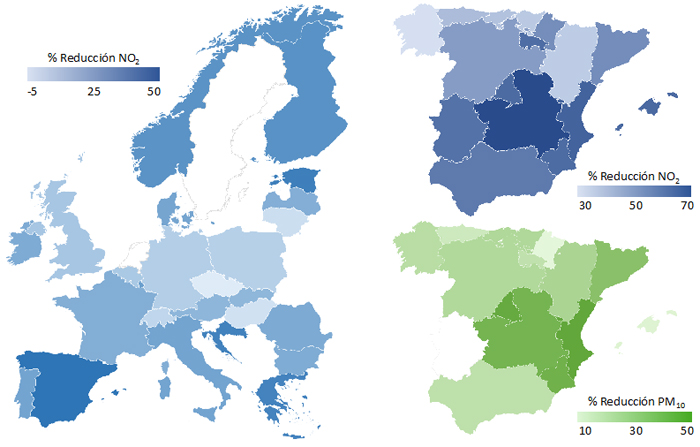Jesus Miguel Santamaria Ulecia, Full Professor in Chemistry Analytical Director of Biodiversity and Environment Institute | University of Navarra
Side effects of COVID-19
Air pollution is a global threat to human health and ecosystems. It is currently perceived by Europeans as the second most important environmental problem after climate change.

According to agreement with the World Health Organization, every year 7 million people die prematurely in the world due to poor air quality, which means a total loss of 323,430 years of life. issue In Spain, the annual number of deaths caused by air pollution amounts to 10,000 people and the associated health costs exceed 3,600 million euros.
All these deaths, like those caused by the coronavirus, mainly affect the elderly and people with previous pathologies, but they do not occur in an explosive manner, but rather in a staggered manner. This may be precisely the reason why there has not yet been a unified political and social response similar to that generated by COVID-19 to the high mortality caused by contamination.
The containment measures adopted by most European Union countries (with the exception of the Netherlands and Sweden) during the COVID-19 crisis have indirectly led to a significant reduction in the concentrations of the main traffic-related pollutants, such as nitrogen dioxide (NO2) and particulate matter smaller than 10 microns (PM10).

Percentage reduction of NO2 and PM10 levels in Europe and Spain before and after confinement. Maps elaborated from the data provided by different air quality monitoring stations located in Europe (576) and Spain (80).
On a European scale, the country that has experienced the greatest drop in NO2 levels is Spain, with a 47% reduction, followed by Estonia (43%), Croatia (42%) and Greece (41%). At the other extreme are Lithuania (2%), Hungary (1%) and the Czech Republic, which, far from decreasing, has seen an increase of 3%.
In Spain, all of the country's provinces have shown a clear improvement in NO2 background levels, with Castilla La Mancha (71%) and the Canary Islands (68%) being the Communities with the greatest reduction in pollution (71% and 68% respectively). In other Communities such as Valencia, Madrid, La Rioja and Murcia, the percentage of improvement exceeds 61%. On the contrary, the northernmost communities (Galicia, Aragon, Basque Country, Cantabria and Asturias) have shown the smallest decrease in NO2 levels (29%), a fact probably related to their greater industrial activity.
As for particulate matter (PM10), the decrease in the levels of this pollutant has not been as high as could have been expected. This is due to the fact that during the second half of March several communities suffered the intrusion of dust-laden African air masses, which has slightly masked the decrease in PM10 caused by the traffic restriction. In any case, PM10 levels have decreased globally by 31%, with Valencia, Madrid, Castilla La Mancha and Murcia being the communities with the greatest decrease (over 43%) after the Canary Islands, where the reduction in PM10 concentrations has exceeded 72%.
Since both NO2 and PM10 are two of the most important tracers of road traffic, the results obtained indicate that the improvement in air quality after the start of the alarm state is due to the significant reduction of this pollution source , which has fallen by 55%.
All these results show that in just one month, pollution levels have been clearly reduced in the various European cities and this should encourage us to reflect on the role that each of us can play to improve our quality of life.
The coronavirus crisis is an excellent opportunity to raise awareness of the power of our actions, which can also be useful in improving environmental health. As citizens, we have in our hands the possibility of achieving transcendental changes, which will be necessary in the coming years in a context of global change. The phrase "think globally and act locally" is more valid than ever.
Since caring for our planet is a fundamental degree program that requires the adoption of sustained measures over time, we must take advantage of the lessons learned from the side effects of COVID-19 to show solidarity, be responsible and fight to improve the quality of life in cities and the health of the environment; our elders and our children will thank us for it.
